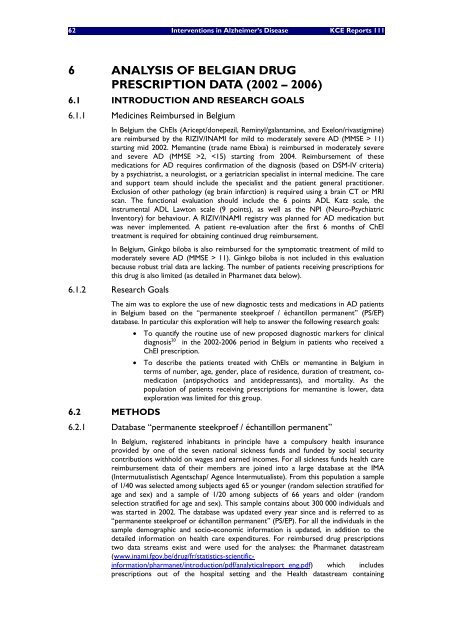Download the full report (112 p.) - KCE
Download the full report (112 p.) - KCE
Download the full report (112 p.) - KCE
You also want an ePaper? Increase the reach of your titles
YUMPU automatically turns print PDFs into web optimized ePapers that Google loves.
62 Interventions in Alzheimer’s Disease <strong>KCE</strong> Reports 111<br />
6 ANALYSIS OF BELGIAN DRUG<br />
PRESCRIPTION DATA (2002 – 2006)<br />
6.1 INTRODUCTION AND RESEARCH GOALS<br />
6.1.1 Medicines Reimbursed in Belgium<br />
In Belgium <strong>the</strong> ChEIs (Aricept/donepezil, Reminyl/galantamine, and Exelon/rivastigmine)<br />
are reimbursed by <strong>the</strong> RIZIV/INAMI for mild to moderately severe AD (MMSE > 11)<br />
starting mid 2002. Memantine (trade name Ebixa) is reimbursed in moderately severe<br />
and severe AD (MMSE >2, 11). Ginkgo biloba is not included in this evaluation<br />
because robust trial data are lacking. The number of patients receiving prescriptions for<br />
this drug is also limited (as detailed in Pharmanet data below).<br />
6.1.2 Research Goals<br />
The aim was to explore <strong>the</strong> use of new diagnostic tests and medications in AD patients<br />
in Belgium based on <strong>the</strong> “permanente steekproef / échantillon permanent” (PS/EP)<br />
database. In particular this exploration will help to answer <strong>the</strong> following research goals:<br />
• To quantify <strong>the</strong> routine use of new proposed diagnostic markers for clinical<br />
diagnosis 20 in <strong>the</strong> 2002-2006 period in Belgium in patients who received a<br />
ChEI prescription.<br />
• To describe <strong>the</strong> patients treated with ChEIs or memantine in Belgium in<br />
terms of number, age, gender, place of residence, duration of treatment, comedication<br />
(antipsychotics and antidepressants), and mortality. As <strong>the</strong><br />
population of patients receiving prescriptions for memantine is lower, data<br />
exploration was limited for this group.<br />
6.2 METHODS<br />
6.2.1 Database “permanente steekproef / échantillon permanent”<br />
In Belgium, registered inhabitants in principle have a compulsory health insurance<br />
provided by one of <strong>the</strong> seven national sickness funds and funded by social security<br />
contributions withhold on wages and earned incomes. For all sickness funds health care<br />
reimbursement data of <strong>the</strong>ir members are joined into a large database at <strong>the</strong> IMA<br />
(Intermutualistisch Agentschap/ Agence Intermutualiste). From this population a sample<br />
of 1/40 was selected among subjects aged 65 or younger (random selection stratified for<br />
age and sex) and a sample of 1/20 among subjects of 66 years and older (random<br />
selection stratified for age and sex). This sample contains about 300 000 individuals and<br />
was started in 2002. The database was updated every year since and is referred to as<br />
“permanente steekproef or échantillon permanent” (PS/EP). For all <strong>the</strong> individuals in <strong>the</strong><br />
sample demographic and socio-economic information is updated, in addition to <strong>the</strong><br />
detailed information on health care expenditures. For reimbursed drug prescriptions<br />
two data streams exist and were used for <strong>the</strong> analyses: <strong>the</strong> Pharmanet datastream<br />
(www.inami.fgov.be/drug/fr/statistics-scientificinformation/pharmanet/introduction/pdf/analytical<strong>report</strong>_eng.pdf)<br />
which includes<br />
prescriptions out of <strong>the</strong> hospital setting and <strong>the</strong> Health datastream containing

















